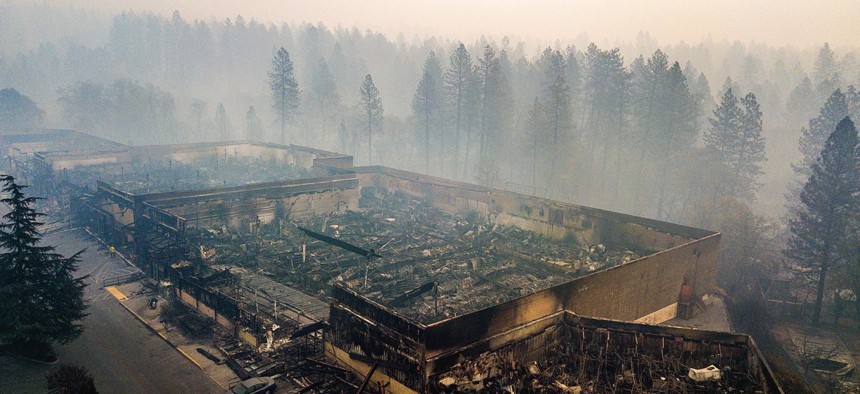Despite Major Wildfires, Most Calif. Local Governments Won’t Feel Credit Ratings Impacts

Smoke hangs over the scorched remains of Old Town Plaza following the wildfire in Paradise, California. Noah Berger / AP Photo

Connecting state and local government leaders
Only small towns and school districts facing significant damage and weak liquidity will likely feel pressure, according to Moody’s.
Most local governments dealing with California’s deadly wildfires won’t see their credit ratings downgraded, according to a weekly Moody’s Investors Service report.
Camp Fire became the deadliest wildfire in California history on Nov. 14 and, together with the Woolsey and Hill fires, had killed 79 people as of Saturday while razing about 237,000 acres and 8,350 buildings.
Federal Emergency Management Agency, state assistance and private insurance are expected to cover most of the costs of debris removal and reconstruction following the federal disasters, according to the outlook.
But that assurance stopped when it came to Paradise, the town of about 20,000 people that has been devastated by the wildfire. Thousands of residents have been displaced and authorities over the weekend said more than 1,200 people were missing.
“We expect select small entities, such as the Town of Paradise and Oak Park Unified School District with significant damage and weak liquidity to be faced with significant credit challenges,” reads the report.
About 80 to 90 percent of Paradise in Butte County burned in Camp Fire, which the report said will cause “dramatic” declines in property, sales and lodging tax revenues—65 percent of the town’s 2017 general fund. People moving away could hurt the town’s ability to recover as other residents look to rebuild, according to the report.
On the other hand, Los Angeles and Ventura counties will see temporary sales tax declines, which should rebound during rebuilding.
“[W]e currently expect impacts to [assessed value] will not materially affect credit quality, as their tax bases are sizable relative to the burned areas, and they have experienced healthy growth in recent years,” reads the outlook. “California local governments have the flexibility to cut spending and can raise taxes with voter approval.”
Dave Nyczepir is a News Editor at Government Executive’s Route Fifty and is based in Washington, D.C.

NEXT STORY: Flint Congressman Not Giving Up on Push to Assist Struggling Cities





